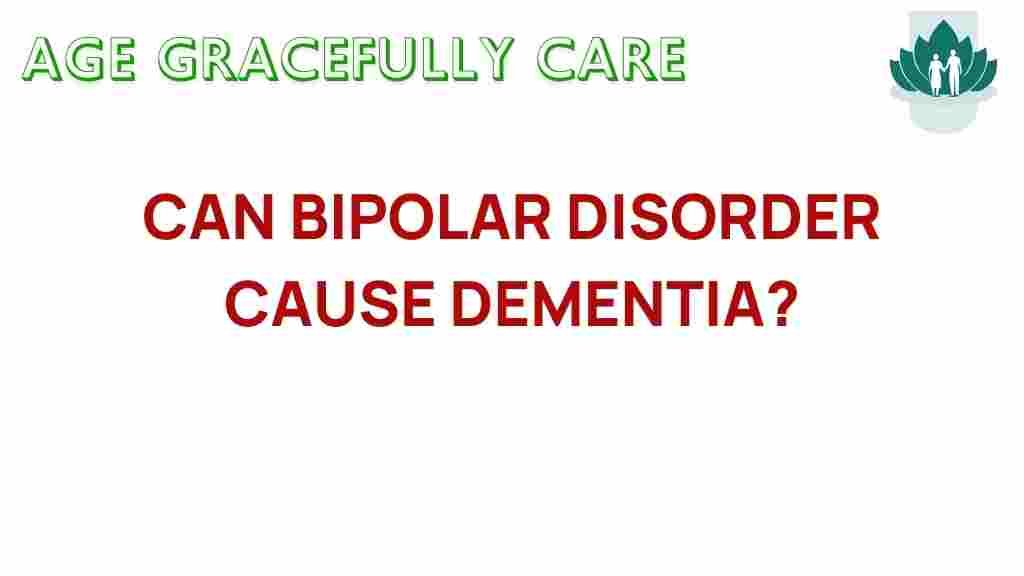Can Bipolar Disorder Be a Silent Contributor to Dementia?
Bipolar disorder and dementia are two significant mental health issues that affect millions of people worldwide. While they are often considered separate conditions, emerging research suggests that bipolar disorder may play a role in the development of dementia as individuals age. Understanding the connection between these two psychological conditions requires a closer look at how mood disorders can impact brain health and contribute to cognitive decline.
Understanding Bipolar Disorder
Bipolar disorder is a mental health condition characterized by extreme mood swings, including emotional highs (mania or hypomania) and lows (depression). These mood changes can affect sleep, energy levels, activity, judgment, behavior, and the ability to think clearly.
- Mania: During manic episodes, individuals may feel euphoric, full of energy, or unusually irritable.
- Depression: In depressive episodes, people may feel sad, hopeless, and lose interest in most activities.
These fluctuations can significantly impact daily functioning and overall quality of life. But beyond the immediate effects, there may be longer-term implications for brain health.
The Link Between Bipolar Disorder and Dementia
Dementia is an umbrella term for a range of cognitive impairments that interfere with daily life. Alzheimer’s disease is the most common form of dementia, characterized by memory loss and cognitive decline. Researchers are increasingly investigating how mood disorders, particularly bipolar disorder, may contribute to the development of dementia.
Some key points regarding the link between bipolar disorder and dementia include:
- Neurological Impact: Bipolar disorder can lead to changes in brain structure and function, potentially increasing the risk of cognitive decline.
- Age Factor: As individuals with bipolar disorder age, the cumulative effects of mood instability may exacerbate neurological deterioration.
- Psychological Conditions: Comorbidities such as anxiety, depression, and substance abuse commonly associated with bipolar disorder can further complicate mental and cognitive health.
Cognitive Decline in Bipolar Disorder
Research indicates that individuals with bipolar disorder may experience cognitive decline earlier than those without mood disorders. This decline can manifest in several ways:
- Memory Loss: Difficulties with short-term memory and recall can become more pronounced over time.
- Attention Deficits: Challenges in focusing and maintaining attention can impede daily functioning.
- Executive Dysfunction: Impairments in planning, decision-making, and problem-solving abilities can arise.
These cognitive challenges can significantly impact the quality of life and may raise concerns about the development of dementia in later years.
Aging and Brain Health
Aging is a natural process that affects everyone, but for those with bipolar disorder, the effects may be compounded. The interplay between aging and bipolar disorder can lead to:
- Accelerated Cognitive Decline: The brain may show signs of aging earlier in life for those with mood disorders.
- Increased Risk of Dementia: Studies suggest that the risk of developing dementia is higher in individuals with a history of bipolar disorder.
Maintaining brain health as one ages becomes crucial, especially for individuals with bipolar disorder. Engaging in proactive measures can be beneficial.
Steps to Promote Brain Health
To mitigate the risks associated with bipolar disorder and cognitive decline, consider the following steps:
- Regular Mental Health Checkups: Stay in touch with mental health professionals to monitor symptoms and treatment effectiveness.
- Engage in Cognitive Activities: Activities like puzzles, reading, and learning new skills can help maintain cognitive function.
- Physical Exercise: Regular physical activity promotes overall brain health and can reduce the risk of cognitive decline.
- Healthy Diet: A balanced diet rich in antioxidants, omega-3 fatty acids, and vitamins can support brain health.
- Social Engagement: Maintaining social connections and participating in community activities can enhance emotional well-being and cognitive function.
Incorporating these practices into daily life can help individuals with bipolar disorder maintain better brain health as they age.
Troubleshooting Cognitive Decline
If you or a loved one with bipolar disorder begins to notice signs of cognitive decline, consider the following troubleshooting tips:
- Track Changes: Keep a journal of any noticeable changes in memory, attention, or problem-solving abilities.
- Communicate with Healthcare Providers: Share observations with mental health professionals to reevaluate treatment plans.
- Explore Treatment Options: Discuss medication adjustments or therapeutic approaches that may help alleviate cognitive symptoms.
- Consider Support Groups: Engaging with others who face similar challenges can provide valuable support and coping strategies.
Addressing cognitive concerns early can lead to better management and improved quality of life.
Conclusion
The relationship between bipolar disorder and dementia is complex and multifaceted. While bipolar disorder primarily affects mood and behavior, its potential contribution to cognitive decline and dementia cannot be overlooked. As the aging population grows, understanding the impact of mood disorders on brain health becomes increasingly important.
By being proactive in managing bipolar disorder and prioritizing mental health, individuals can take significant steps toward preserving their cognitive functions and overall well-being. For more information on mental health and cognitive decline, consider visiting this resource for further insights.
In conclusion, recognizing the silent potential of bipolar disorder as a contributor to dementia is essential for fostering a comprehensive approach to mental health and aging. Awareness, education, and proactive measures can empower individuals to better navigate the challenges of both conditions.
This article is in the category Health and created by AgeGracefullyCare Team
